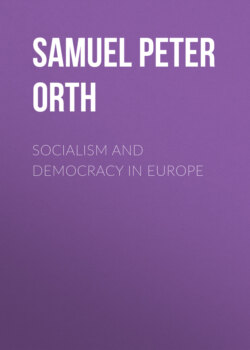Читать книгу Socialism and Democracy in Europe - Samuel Peter Orth - Страница 16
На сайте Литреса книга снята с продажи.
SUMMARY OF THE PERIOD OF REVOLUTION
ОглавлениеThese revolutions were political in that they were a protest against existing governmental forms. The revolutionary proletarian was found in all of them. He not only stood under the standard of Daniel Manin in Venice, when that patriot again proclaimed a republic in the ancient city, and shared with Mazzini his triumph in Rome, and fought with Kossuth for the liberty of Hungary; but he formed also the body of the revolutionary forces in Germany, Austria, and France.
In all the Continental countries the uprisings were directed against the arrogance and oppression of monarchism, and against the recrudescence of feudalistic ideals. In France Louis Philippe had attempted the part of a petty despot. He restricted the ballot to the propertied class, balanced his power on too narrow a base, and it became top-heavy.
While the workingmen of Germany and Austria were taking up arms under command of the middle class against the feudal remnants, the workingmen of France were sacking their capital because of an attempted revival of monarchic privilege, and the workmen of England were marching and counter-marching in monster torchlight parades in protest against middle-class domination.
The panorama of Europe in these years of turmoil and blood thus exhibits every degree of revolt against governmental power, from the absolutism of Prussian Junkerdom and the oppression of the Hungarians by foreign tyranny, to the dominance of the aristocratic and middle-class alliance in Great Britain.
The bread-and-butter question was not wanting in any of these political uprisings. The unity of life makes their separation a myth. One is interwoven with the other. The social struggle is political, the political struggle is social.
Socialism is not merely an economic movement. It seeks to-day, and always has sought, the power of the state. The government is the only available instrument for effecting the change—the revolution—the Socialists preach, the transfer of productive enterprise from private to public ownership. "Political power our means, social happiness our end," was a Chartist motto. That is the duality of Socialism to-day.
